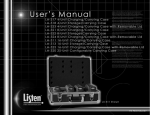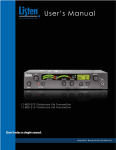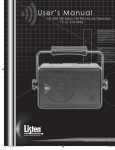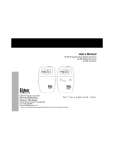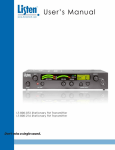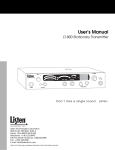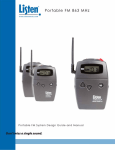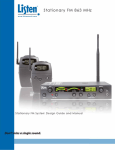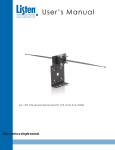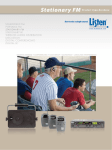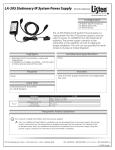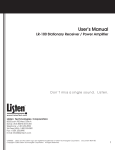Download Listen Technologies LT-700-150 User's Manual
Transcript
Dear Valued Customer, Thank you for choosing Listen! All of us at Listen are dedicated to providing you with the highest quality products available. We take great pride in their outstanding performance because we care that you are completely satisfied. That’s why we independently certify them to the highest quality standards and back them with a limited lifetime guarantee. We stand ready to answer any questions you might have during installation or in the operation of our products. Should you experience any problems whatsoever with your Listen products, we are ready to help you in any way we can with prompt, efficient customer care. Because at Listen, it’s all about you! And should you have any comments on how we might improve our products or our service, we’re here to listen. Here’s how to reach us: +1.801.233.8992 +1.800.330.0891 North America +1.801.233.8995 fax [email protected] www.listentech.com Thank you and enjoy your listening experience! Best regards, Russell Gentner and the Listen Team • In the few instances where repairs were needed, 99% of all clients indicated that they were happy with repair turn-around-times and 85% of the time, clients were without their product for less than 10 days! • Overall client satisfaction of working with Listen was rated 4.8 out of 5. • “Please continue with your excellent attitude toward customer satisfaction. You guys are great!” • “I’ve never had such good service from any company. Keep up the good work!” • “You stand behind your product wonderfully.” Assistive Listening • Language Interpretation • Soundfield • Tour Group • Conferencing LT-700 Table of Contents Package Contents 150 MHz Specifications Quick Reference Setup Instructions Operating Instructions Programming Instructions 3 4 5 7 9 10 Charging Batteries Wall Transformer Operation Channel Selection Listen SQ™ RF Reception Maximization Strategies 150 MHz Frequency Chart 11 12 13 14 15 16 Troubleshooting Warranty Contact Information Optional Accessories 17 19 19 20 1 LT-700 Package Contents LT-700-150 Contents • LT-700-150 (150 MHz) Listen Part Number LT-700-150 (150 MHz) Optional Accessories See page 20 3 LT-700 Specifications Architectural Specifications The portable FM transmitter shall be capable of broadcasting on 32 channels. The unit shall incorporate a microphone sensitivity switch. The device shall broadcast on both wide and narrow band channels with a SNR of 80 dB or greater. The device shall have an audio frequency response of 50 Hz to 15 KHz (±3 dB). The device will incorporate a mute switch. The battery door shall be capable of being mechanically locked. The device shall incorporate an LCD display that indicates channel, battery level, low battery, battery charging, and RF signal strength. The device shall be able to enable companding. The unit shall operate off of two (2) AA batteries; alkaline or NiMH. The portable transmitter shall incorporate automatic battery charging circuitry for recharging of NiMH batteries, with the ability to charge via a wall transformer or drop in charging case. The Listen LT-700-150 is specified. Specifications* RF Frequency Range 150.8000 MHz - 152.3500 MHz Number of Channels 6 wideband, 26 narrowband Number of Simultaneous Transmitters Frequency Accuracy 50 PPM Transmission Range up to 45.72 m (150 ft.) Antenna Antenna Connector Compliance System Frequency Response System Signal to Noise Ratio System Distortion Microphone Input Microphone Sensitivity Line Input Microphone Power User Controls Controls & Indicators Set-up Controls (battery compartment) Programming LED Display Battery Type Battery Life (Listen batteries) Battery Charging (NIMH only) Power Power Supply Power Supply Connector Power Supply Compliance Dimensions (H x W x D) Color Physical ± .005% stability 32 to 122º (0 to 50ºC) Transmitter Stability Output Power Audio Six (6) 10 mW maximum Uses microphone cable 3.5 mm connector C-Tick 50 Hz - 15 kHz (±3dB) SQ enabled 80 dB, SQ disabled 60 dB <2% total harmonic distortion (THD) at 80% deviation Unbalanced, tip of 3.5mm connector, -20 dbu nominal, -30 dbu maximum, impedance 21 ohms Three position switch: high, middle, and low; 6 db increments Unbalanced, ring of 3.5mm connector, -10 dbu nominal input level, -3 dbu maximum, impedance 10K ohms 3 VDC Bias Power, mute, channel UP/DOWN Mic sensitivity, NiMH/alkaline battery, SQ enable/disable Channel lock out, Channel lock Red, illuminated when unit is on. Flashes when batteries are low, or to indicate charging. Flashes when muted. Channel Designation, lock status, signal strength indication, battery life, RF Power Two (2) AA batteries, alkaline or NiMH 15 hours alkaline (LA-361), 8 hours NiMH rechargeable (LA-362) Fully automatic, 13 hours I/P 120VAC; O/P 7.5VDC 250 mA; Drop in contact points for use with charging cases. Power supply not included (LA-208) 2.3mm OD by 0.7mm ID, barrel type connector 7.5 VDC, center positive <250 mA. Drop in contact points for use with Listen charging cases RoHS, WEEE, UL, PSE, CE, CUL, TUV, CB compliant 3.00 x 1.00 x 5.00 in. (7.6 x 2.5 x 13.0 cm) Dark Grey with white silk screening Unit Weight 3.9 oz (111g) Unit Weight with batteries 5.8 oz (164g) Shipping Weight Door 1.0 lbs. (0.45kg) Manually Lockable (on sides). Up, down, and power buttons through door * Specifications are subject to change without notification. 4 LT-700 Quick Reference LT-700 Front MUTE / TALK switch (more information on page 9) 3.5 mm Input Jack A Listen microphone or line level cable connects here. Look & Listen Display™ The display shows level, channel, battery status, PROGRAM mode, whether a channel is locked, and whether a channel is locked out from selection (PROGRAM mode). See close-up below. 150 Use UP and DOWN buttons to select a channel. Press and hold either button for 5 seconds to lock the channel. Press and hold either button again to unlock. Power Switch Press PWR switch to turn unit on. Press and hold to turn unit off. When in PROGRAM mode, this switch is used to toggle the lock out (L/O) mode for a channel. Press and hold both buttons for 5 seconds to enter PROGRAM mode. The PGM icon will appear in the display. To exit PROGRAM, let unit sit idle for 5 seconds. LT-700 Look & Listen Display When dots are illuminated, the microphone is active. If this display does not appear, the microphone is muted. Indicates the unit is in PROGRAM mode. To enter PROGRAM mode, press and hold the UP and DOWN keys until the PGM icon appears in the display. To exit PROGRAM mode, let the unit sit idle for 5 seconds. Indicates the currently tuned channel Battery level indicator. The indicator flashes, along with the red LED on top of the unit, to alert you when the battery is low and needs to be charged or changed. (see information below) If the padlock icon is visible, the channel is locked. Press and hold either the UP and DOWN button for 5 seconds to lock or unlock. When in the PROGRAM mode, L/O indicates whether a particular channel is locked out. LT-700 Battery Indicator All three segments showing: The batteries are at 50% or greater capacity. Two segments showing: The batteries are at 25-49% capacity. One segment showing: Your batteries less than 25% capacity. When this segment begins flashing along with the LED on top of the unit, you should immediately change your batteries or recharge them (if using NiMH batteries). 5 LT-700 Quick Reference LT-700 Inside Access Door Battery Select Switch SQ Switch Mic Sensitivity Switch Mic Sensitivity Switch - it arrives set at MED, which will work for most microphones. If your mic level is too low, change the switch to HI; if the level is too high, switch to LO. (see page 7 for more information) Battery Select Switch - place in NiMH position ONLY if you are using Nickel Metal Hydride batteries, otherwise, leave it in the Alkaline position. SQ Switch: shipped in the ON position, use a screwdriver or pen to slide to the OFF position if needed. You should turn SQ off if you are using any non Listen receiver or older Listen receiver that does not have the SQ feature. (see page 14 for more information) LT-700 Top of Unit MUTE / TALK switch - this mutes the mic only and not the line input when in the mute position. LED indicators: Steady Red: Normal operation Slow Flashing: Battery is low Slow Flashing while charging: Unit is charging Fast Flashing: Mute 3.5mm Input Jack A microphone or line level cable connects here. A Note on Charging NiMH Batteries If you are using NiMH batteries in any Listen product, you should allow adequate time for the charger (charging case or LA-208) to complete a full charge cycle on the batteries. This takes about 13 hours. 6 LT-700 Setup Instructions 1 Remove the product Remove outer packaging and plastic cover. Inspect for physical damage. If damage is apparent, please contact Listen Technologies Corporation technical support for assistance. See page 19 for contact information. 2 Open the front access door If locked, use a pocketknife or small screwdriver to unlock the door locks on both sides of the unit. To unlock the door, rotate the lock 1/4 turn counterclockwise. Grip the two tabs with your thumb and index finger and pull the door downward. Do NOT place batteries in the unit yet. 3 Select Battery Type See diagram below. You have two choices: NiMH and Alkaline. The unit is shipped with the switch in the Alkaline position. Use a pen or small screwdriver to select the battery type. Unlocked Locked CAUTION: If you are using any battery type other than rechargeable Nickel Metal Hydride (NiMH) batteries, make sure the BATTERY selection switch is in the alkaline position. WARNING: Do not place the BATTERY switch in the NiMH position if you are not using Nickel Metal Hydride Batteries. The NiMH position will attempt to charge any batteries in the unit, even if they are not the proper type. Charging non-Nickel Metal Hydride (NiMH) batteries will result in physical harm, destruction of property and/or fire. 4 5 Set SQ switch The SQ switch is inside the battery compartment next to the Battery Battery Select Select switch. The unit is shipped with SQ in the ON position. To turn it Switch off, use a small screwdriver or pen to slide the switch to the OFF position (to the right). See page 14 for more information on SQ. Mic Sensitivity Set Mic Sensitivity Switch The microphone sensitivity switch is located inside the battery compartment, to the left of the BATTERY selection switch. The LT-700 is shipped with this switch in the center (MED) position. Listen recommends the following settings for our microphones. If you are using a microphone from another vendor, you may need to experiment with different settings. Part # LA-261 LA-262 LA-270 LA-272 LA-274 LA-276 LA-277 LA-278 LA-279 Description Lavalier Microphone Over-the-Head Microphone Noise Canceling Microphone Over-the-Head Microphone w/Earphone Handheld Microphone Collar Microphone Conference Microphone Behind-the-Head Microphone Over-The-Ear Microphone Presentation Style Setting MED MED MED MED HI HI MED MED Lo SQ Switch Switch NOTE: If the setting is too low for the microphone the audio will be faint. If the setting is too high for the microphone in use the audio will be distorted. 7 LT-700 Setup Instructions (cont.) 6 Place Batteries in Unit Place two (2) AA batteries in the compartment, making note of the battery polarity shown in the battery compartment, and again verifying that the BATTERY SELECT switch is in the correct position for the batteries you are using. (ALK should be selected for all battery types other than NiMH). NOTE: Listen uses 2300mAh (milli-Amp-hour) constant current NiMH (Nickel Metal Hydride) batteries. These may be purchased from your Listen dealer (ask for part number LA-362). 7 Connect the Microphone The microphone jack is located on top of the unit. The LT-700 uses the microphone cable as an antenna for transmitting. 8 Optional - Connect the Line Input Cable. This cable allows you to connect a TV, CD player or other equipment to the LT-700. To do this, you must order the Listen LA-263 Line Input Cable (it is not included with your unit). This cable allows you to connect both a microphone and line input to the jack on top of the LT-700. See the diagram below for connection information. You can use the microphone and the line input at the same time. Please note that the MUTE switch mutes only the microphone; the line source will continue transmitting when the switch is in the MUTE position. If you prefer to make your own cable for connection of mic and line inputs, connection shown in the following diagram: Mono-White Video-Yellow Stereo-Red LA-263 1 8 mm LT-700 Operating Instructions 1 Make sure the unit is on When you press the power button, the LED on top of the unit will be illuminated and the LCD display will be visible. 2 Select the channel for transmitting Please refer to Channel Selection on page 13 for guidelines on choosing an interference-free channel. To select a channel, press either the channel UP or DOWN button until the display reads the channel you want. To lock your selection, press and hold the UP or DOWN button for 5 seconds. When locked, the small padlock icon will be visible on the display. Press and hold either button again to unlock. 150 MHz Units The LT-700-150 operates on 6 wide band channels and 26 narrow band channels. 3 Close the Access Door Lock it if desired by turning the locks on the side of the unit to the vertical position. See diagram on page 7. 4 Using the red MUTE / TALK switch on top of the unit The red mute/talk switch on top of the unit is a handy way to “turn off” the audio from the microphone. Slide the switch to the mute position and the microphone audio is muted. When the microphone audio is muted, the LED on top of the unit flashes rapidly. Slide the switch back to the talk position and the microphone audio will return to the transmission. If you are using line level audio, it will not be effected by the mute/talk switch. LT-700 Shown in the TALK position 9 LT-700 Programming Instructions The LT-700 can be programmed to transmit on a limited number of channels. For applications where users are required to select a channel (such as classrooms or language interpretation), and you don’t want them to have to scroll through all of the available channels, this feature is ideal. You can set up the LT-700 so that only the channels they need to use are available for selection with the UP and DOWN buttons. 10 1 Enter PROGRAM Mode Press and hold the UP and DOWN keys simultaneously until the PGM symbol is displayed (see the Look & Listen™ Quick Reference on page 5). 2 Scroll Through Channels to Lock or Unlock Use the UP and DOWN channel select keys to scroll through all available channels. If the L/O symbol appears with a particular channel’s indicator, this means that particular channel will not be available for selection by the user. To toggle a channel between locked out and available, press the POWER button. 3 To exit PROGRAM mode Allow the unit to sit idle (don’t press any buttons) for 5 seconds. The LT-700 will exit the PROGRAM mode and the PGM icon will disappear. LT-700 Charging Batteries The LT-700 and all Listen receivers are unique because they have SmartCharge™ chargers built in. When any of these units are connected to an LA-208 wall transformer or dropped into a Listen charging case, NiMH batteries will be charged. 1 To charge the batteries using the LA-208 wall transformer, plug the transformer into the jack marked “PWR/CHG” on the side of the unit. The unit can be operated while the batteries are charging. 2 To charge the batteries using a drop-in charger, simply place the unit into a slot in the charger and connect the charger to power. Make sure the unit is fully seated in its slot. Connect LA-208 here and plug it into an AC wall outlet. There are several charging cases available from Listen. Check the Listen website for more details. SmartCharge™ uses a pulse charging, which greatly extends the life of Nickel Metal Hydride (NiMH) batteries. The entire charging process takes about 13 hours. Listen recommends that you allow the charger to complete its full cycle every time for maximum battery life. IMPORTANT: DO NOT ATTEMPT TO CHARGE ANY TYPE OF BATTERY OTHER THAN NiMH (NICKEL METAL HYDRIDE) with your Listen equipment. Alkaline batteries may explode when connected to a charger. Other risks of charging non-NiMH batteries include destruction of property or fire. IMPORTANT: In order to charge NiMH batteries, the BATTERY SELECT switch in your Listen product must be set to the NiMH setting. Use a pen or small screwdriver to move the switch (located in the battery compartment) to the proper position. 3 During the charge cycle, the red LED on top of the Listen product will flash slowly. When charging is completed, the LED will turn off. It is not necessary to unplug the charger; however, if you unplug the unit from the charger and then plug it back in, it will begin the 13-hour charge cycle over again. When not using the LT-700, it is recommended to leave the unit on the charger. The charger provides a maintenance charge that keeps the battery at 100%. If the unit is not on the charger, the battery will lose up to 20% of its charge per month. NOTE: Listen uses 2300mAh (milli-Amp-hour) constant current NiMH (Nickel Metal Hydride) batteries. These may be purchased from your Listen dealer (ask for part number LA-362). One of several charging cases available from Listen. See www.ListenTech.com for more options. LA-311 - 16-unit Drop In Charging Case shown 11 LT-700 Wall Transformer Operation The LT-700 will operate normally when connected to a wall transformer. Use Listen part number LA-208, available from any Listen dealer. Connect the wall transformer to the jack on the side of the LT-700 marked “PWR/CHG” and plug the wall transformer into a grounded AC outlet. You do not need to have batteries installed in the LT-700 to operate it with a wall transformer. NOTE: If batteries are in the unit ensure that the battery selection switch is set properly as shown on page 7. Please review the information on page 11 for important information regarding battery type and charging. 150 12 Channel Selection It is important to choose channels that are free from interference to achieve proper operation of your Listen equipment. This process is trial and error. Before turning on the transmitter, listen to the wide band channels. Listen to the audio through the headphone or on a Listen receiver or receiver / speaker. Choose a channel with the least amount of interface. Unless you are interfacing with an existing narrowband transmission system, always use a wide band channel. If you are using multiple channels follow this process: a. Same Space If you are using multiple transmitters in the same space, the maximum number of channels that will work simultaneously is six at 150 MHz. With all of the transmitters off, listen for interference on all the wide band channels via the headphone jack on a Listen receiver. Using the frequency chart on page 16, eliminate any channels that have noticeable interference. Now choose the channels with the widest channel spacing. It is recommended that adjacent channels be spaced at least 300 kHz. b. Distributed spacing if you are using transmitters that are spread out over space, you can achieve more simultaneous broadcast channels. However, it is critical that your receiver(s) be located as close to its transmitter as possible. You can use adjacent channels (see frequency chart on page 16) in this case as long as the adjacent channel transmitter is at least 50% further away from the receiver as its transmitter. It is highly recommended that after channel selection has been achieved, you lock the channel so that it cannot be changed by the user. To accomplish LOCK on the LT-700, press both the UP or DOWN buttons simultaneously for 5 seconds. Repeat the process to unlock. Wide Band Recommendation Listen recommends that you always use a wide band channel unless you need to be compatible with existing narrow band receivers from other manufacturers. Wide band channels have lower noise than their narrow band counterparts. At 150MHz The LT-800 at 72MHz operates on 6 wide band channels and 27 narrow band channels. • Numbers (0-6)= Wide Band Channels (Example: 4) • Numbers (7-32)= Narrow Band Channels (Example: 32) 13 Listen SQ™ - Improving your Listening Experience People are accustomed to listening to low noise, high fidelity audio (delivered via CD, DVD, etc.). FM radio systems, such as those made by Listen, have more inherent noise compared to most sound systems. To minimize noise, Listen uses a noise reduction technology called ListenSQ™. Both the transmitter and receiver must have the SQ feature enabled to achieve the desired results. SQ is available on new Listen systems, including the system you received in this shipment. If you are planning to use this product with older Listen systems that do not have Listen SQ or equipment not manufactured by Listen, you should disable Listen SQ. Your Listen equipment has been shipped to you with the SQ feature enabled. You may need to disable the SQ function for one or more of the following reasons: 1. You are using your new Listen system with older version Listen equipment that does not have the SQ function. 2. You are using your new Listen system with equipment supplied by other manufacturers. 3. You expect that end users may bring and use their own receivers that donít have the SQ function. 14 • SQ is NOT squelch • Improves noise performance by at least 20dB • SQ is NOT compatible with older version Listen products • SQ is NOT compatible with other manufacturers products • To work properly, SQ must be enabled for both the transmitter and receivers • SQ can be disabled to permit operation with older Listen products or other manufacturers products RF Reception Maximization Strategies For proper and dependable operation, Listen receivers should receive a strong and consistent signal from the originating transmitter. The following strategies should be used maximize this signal: a. When using your system, keep in mind that the location of both the transmitter and receiver is critical to maximizing signal strength. b. Eliminate or minimize obstructions between the transmitter and the receivers. c. Minimize the distance between the transmitter and the receivers. d. Stay clear of metal objects. e. Keep the microphone and headphone cables fully extended. Do not shorten or coil microphone and headphone cables. These cables are the antennas for you portable products. 15 150 MHz Compatibility Chart Channel 01 02 03 04 05 06 07 08 09 10 11 12 13 14 15 16 17 18 19 20 21 22 23 24 25 26 27 28 29 30 31 32 16 Frequency 150.900 152.400 151.500 152.100 151.200 151.800 150.850 150.950 151.000 151.050 151.100 151.150 151.250 151.300 151.350 151.400 151.450 151.550 151.600 151.650 151.700 151.750 151.850 151.900 151.950 152.000 152.050 152.150 152.200 152.250 152.300 152.350 LT-700 Troubleshooting Troubleshooting The LT-700 has no power Make sure the unit has fully charged batteries, or has a Listen LA-208 wall transformer connected to it. Press the ON button. If this does not work, try a different set of batteries. Make sure the batteries are installed correctly. There is no audio Make sure the MUTE/TALK switch is in the TALK position. Make sure you have the microphone plugged all the way in to the input jack. Make sure you are using a Listen approved microphone (see list on page 7). If you are using the line input, make sure you have connected a line level, unbalanced input at the ring of the connector. The audio is distorted Make sure you are using an approved Listen microphone. Try using a different mic sensitivity switch setting (the switch is located inside the battery compartment of the unit). If you are using a line level input, try turning down the level of the input. If you are using any equipment that does not have SQ capability, turn off SQ in the LT-700. There is hum in the audio The microphone may be too close to a transformer. Try moving around and see if the hum goes away. The microphone level is low The microphone must be in close proximity to the person who is speaking. If this does not work, try using a head-worn microphone. The mic sensitivity switch may be on the wrong setting, see page 7. Try a different setting (the switch is located inside the battery compartment). Some microphones have directional pickups, ensure that the microphone in use is oriented and positioned properly (pointing at the speakers mouth). The audio doesn’t have much fidelity If your receivers all have SQ capability, activate SQ in all units by moving their switches to the ON position. In the LT-700 and all SQ-equipped receivers, the SQ switch is located inside the battery compartment. See page 14 for more information. There is too much noise This is most likely because the microphone is not close enough to the speakers mouth, and it is picking up background noise. Try positioning the microphone closer or try using a microphone that is directional (such as a head-worn mic). If you are using a narrow band channel, try switching to a wide band channel. Try another setting on the mic sensitivity switch (located inside the battery compartment). Ensure the microphone is not brushing up against anything. See page 7 for more information. There is interference Try different frequencies until you find a clear channel. I cannot pick up the signal on the receiver Make sure the transmitter and the receiver are on the same frequency band and channel. I can pick up the signal on the receiver, but it sounds like it’s not tuned in Check to make sure the transmitter and receiver are on exactly the same channel number / letter. If using another brand of receiver refer to Listen’s Frequency Chart on page 16). 17 LT-700 Troubleshooting (cont.) Troubleshooting There is not sufficient range The LT-700 is a portable transmitter that uses the microphone cable as an antenna and the range will vary depending on the location of the receivers compared to the transmitter. You can only expect about 100 feet of average effective working range. It’s confusing for users to have 32 channels when switching between channels Use the PROGRAM function to lock out unwanted channels. This way, users will only need to scroll among a few channels. I cannot change the channel It is probably locked (check for the padlock icon). To unlock, press and hold the UP or DOWN button for 5 seconds. My batteries are not charging Make sure you are using NiMH batteries and that the BATTERY SELECT switch (inside the battery compartment) is set to the NiMH position. Make sure the batteries are installed correctly. Make sure you are using the right kind of wall transformer (Listen part number LA-208) or charging case. Make sure the charging case is connected to power and the unit is securely pushed into its slot in the case. NOTE: Listen uses 2300 mAh (milli-Amp-hour) constant current NiMH (Nickel Metal Hydride) batteries. These may be purchased from your Listen dealer (ask for part number LA-362). 18 Warranty & Contacting Listen Warranty Listen Technologies Corporation (Listen) warrants its transmitters and receivers (LT-82, LT-700, LT-800, LR-42, LR-44, LR-400, LR-500) to be free from defects in workmanship and material under normal use and conditions for the useful lifetime of the product from date of purchase. Listen warrants its Stationary IR Radiators (LA-140) to be free from defects in workmanship and material under normal use and conditions for three years from the date of purchase. Listen warrants its Noise Canceling Microphone (LA-270) to be free from defects in workmanship and material under normal use and conditions for one year from date of purchase. Listen warrants its Charging/Carrying Cases (LA-306, LA-311, LA-313, LA-317, LA-318, LA-319, LA-320, LA-321, LA-322, LA-323, LA-324, LA-325) to be free from defects in workmanship and material under normal use and conditions for one year from date of purchase. All other products and accessories are warranted for 90 days from date of purchase. This warranty is only available to the original end purchaser of the product and cannot be transferred. Warranty is only valid if warranty card has been returned within 90 days of purchase. This warranty is void if damage occurred because of misuse or if the product has been repaired or modified by anyone other than a factory authorized service technician. Warranty does not cover normal wear and tear on the product or any other physical damage unless the damage was the result of a manufacturing defect. Listen is not liable for consequential damages due to any failure of equipment to perform as intended. Listen shall bear no responsibility or obligation with respect to the manner of use of any equipment sold by it. Listen specifically disclaims and negates any warranty of merchantability or fitness of use of such equipment including, without limitation, any warranty that the use of such equipment for any purpose will comply with applicable laws and regulations. The terms of the warranty are governed by the laws of the state of Utah. In the first ninety days after purchase, any defective product will be replaced with a new unit. After 90 days, Listen will, at its own discretion either repair or replace transmitters and receivers with a new unit or a unit of similar type and condition. Product that is not covered under warranty shall be repaired or replaced with a unit of similar type and condition based on a flat fee. Contact Listen for details. This limited warranty, prices and the specifications of products are subject to change without notice. Contacting Listen If technical service is needed, please contact Listen. Pre-authorization is required before returning Listen products. If products were damaged in shipment, please contact the carrier, then contact Listen for replacement or repair requirements payable by the carrier. Listen’s corporate headquarters are located in Bluffdale, Utah U.S.A. and are open Monday through Friday, 8am to 5pm Mountain Time. 14912 Heritagecrest Way Bluffdale, Utah 84065-4818 +1.801.233.8992 +1.800.330.0891 North America +1.801.233.8995 fax [email protected] www.listentech.com 19 Optional Accessories Microphone Accessories LA-261 Microphone LLavalier li Mi h LA-276 Collar Microphone LA-262 Over-the-Head Microphone LA-277 Conferencing Microphone LA-270 Noise Canceling Microphone LA-278 Behind-the-Head Microphone LA-272 Over-the-Head Mic w/ Earphone LA 2 LA-2 LA-279 Over-the-Ear Microphone Presentation Style LA-274 Hand-Held Microphone LA-263 Line/Mic Y Input Cable for LT-700 Accessories LA-361 High Capacity AA Alkaline Batteries (2) LA-311 LA-313 LA-317 LA-318 LA-320 LA-321 LA-322 LA-323 LA-324 LA-325 20 16-Unit Portable Charging/Carrying Case 16-Unit Portable Carrying Case 4-Unit Portable Charging/Carrying Case 4-Unit Portable Carrying Case Configurable Carrying Case 8-Unit Portable Charging/Carrying Case 8-Unit Portable Carrying Case 4-Unit Portable Charging/Carrying Case w/Removable Lid 8-Unit Portable Charging/Carrying Case w/Removable Lid 16-Unit Portable Charging/Carrying Case w/Removable Lid LA-362 Rechargeable AA NiMH Batteries (2) Notes 21 Listen Technologies Corporation 14912 Heritagecrest Way Bluffdale, Utah 84065-4818, U.S.A. +1.801.233.8992 1.800.330.0891 North America +1.801.233.8995 fax www.listentech.com Printed in China © 2009 Listen Technologies Corporation® All Rights Reserved 09162009


























